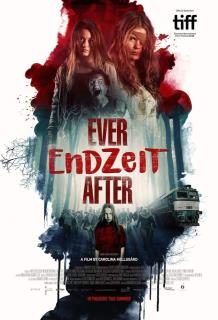Endzeit or Ever After
Rated: Not Rated

It can be hard to stand out in a field as overcrowded as that of the zombie apocalypse genre. Any quick internet search for a count of zombie films brings back hundreds of entries, and no list is ever truly complete, depending on whom you ask. (I began counting the films on this page, but gave up in the Bs: https://en.wikipedia.org/wiki/List_of_zombie_films). So what is a filmmaker to do? How can they make their film different enough to bring a wider audience, while also appeasing the traditionalists when it comes to all things zombie?
Carolina Hellsgård and Olivia Vieweg came up with the perfect solution to this conundrum with their film Endzeit (literally meaning “Last Days”, the film’s English title is Ever After).
The film centers on Vivi and Eva. It’s two years post-apocalypse in the German city of Weimar, one of only two cities in Germany left standing. In Weimar the policy is to shoot those infected with the zombifying virus on site, whether the infection has reached the brain of the victim yet, or not. The other city, Jena, is focused more on finding a cure. Vivi and Eva unwillingly team up to journey from Weimar to Jena, meeting and fighting monsters, both internal and external, along the way.
The film touches on many deeper themes, while keeping action seekers appeased with regular zombie attacks. Depression, PTSD, suicide, guilt, the resilience of nature, and the inner strength of women are all featured prominently amongst images of the glorious Black Forests of Germany. Cinematographer Leah Striker easily finds beauty amongst the horror, and is able to feature nature itself as a silent character in the film. Through shots of giraffes in a field; the sunset glistening off grass growing through the pavement; and the dense, darkness of the forests; Striker and director Hellsgård showcase the beauty of Mother Nature, while proving how tough she can be.
Endzeit is unique not only because it more than passes the Bechdel Wallace test, but also because it features a nearly all female cast and crew, and it has little, to no male speaking roles. In a genre known for its male toughness, it’s refreshing to see women take the lead.
This quote, from an interview with Executive Producer Ingelore König sums up the film and it’s rather groundbreaking themes nicely:
“In our industry in Germany, it is primarily men who have a say when it comes to genre films. And yet, I know enough women who are also interested. But a bit differently: we also need a really emotional story and have the expectation that it should be about something that is important to people. Violence and action for their own sake are often just tedious. We especially want to get women excited about a road movie through a dystopian world. It’s about a friendship that gets off to an unusual start and ends up even more unusually. It’s about finding your own vision of life in a broken world, a vision apart from fenced-in cities and the insane belief that walls can save us. The film tells a story of nature’s survival despite human greed. These are topics that are of particular relevance to younger people – and, of course, to lovers of the zombie genre, too.”
Endzeit (or Ever After) is not rated, was written by Olivia Vieweg and directed by Carolina Hellsgård. It stars Gro Swantje Kohlhof, as Vivi, and Maja Lehrer, as Eva. More information about the film can be found here: